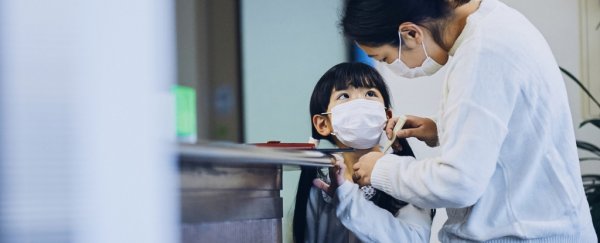If the new coronavirus is anything like its family members, a new study suggests it could survive on inanimate objects for well over a week.
According to the United States Centers for Disease Control and Prevention (CDC) it's "currently unclear if a person can get COVID-19 by touching a surface or object that has the virus on it and then touching their own mouth, nose, or possibly their eyes."
In fact, not a lot is known about the COVID-19 virus at all, so researchers are turning to similar coronaviruses, like SARS and MERS, for answers.
Reviewing the literature on all available human and veterinary viruses within this family, encompassing 22 studies, researchers have found that the human pathogens can persist on surfaces and remain infectious at room temperature for up to nine days. (To put that in perspective, the measles virus can live on contaminated surfaces for up to two hours.)
Granted, that's the upper end of a coronavirus lifespan, but on average, researchers say this family of viruses can survive between four and five days on various materials like aluminium, wood, paper, plastic and glass.
Some of the veterinary coronaviruses - the ones that can only infect animals - could even persist for longer than 28 days.
"Low temperature and high air humidity further increase their lifespan," says physician Günter Kampf at the Greifswald University Hospital.
To reduce the spread of coronaviruses in general, the authors of the new study suggest hospitals carefully disinfect surfaces with various solutions made from sodium hypochlorite, hydrogen peroxide, or ethanol.
In their study, they found these particular WHO recommendations to be "very effective" against SARS and MERS.
The results were originally bound for a future textbook, but under the circumstances, the authors felt it was best to publish their findings in advance. They think the results might also extend to the COVID-19 virus.
"Different coronaviruses were analysed, and the results were all similar," says virologist Eike Steinmann form Leibniz University Hanover.
None of the viruses were 2019-nCoV however, and the team indicated they don't have data on whether hands can become contaminated with coronavirus after patient contact or after touching contaminated surfaces.
While MERS doesn't transfer as easily from person to person as other coronaviruses, SARS spreads rather efficiently whenever an infected person sneezes or coughs. If the mucous lands on a surface and is touched by a person later, it can then contaminate them, even if the contact occurs days after the initial exposure.
Given how threatening this could make 2019-nCoV, washing our hands often and making sure to disinfect public areas seems like a harmless price to pay.
"In hospitals, these can be door handles, for example, but also call buttons, bedside tables, bed frames and other objects in the direct vicinity of patients, which are often made of metal or plastic," explains Kampf.
The study was published in the Journal of Hospital Infection.
